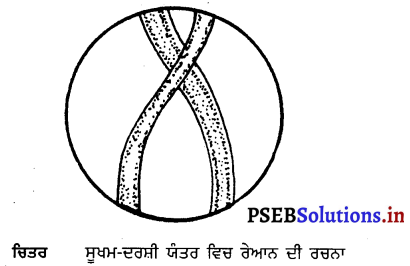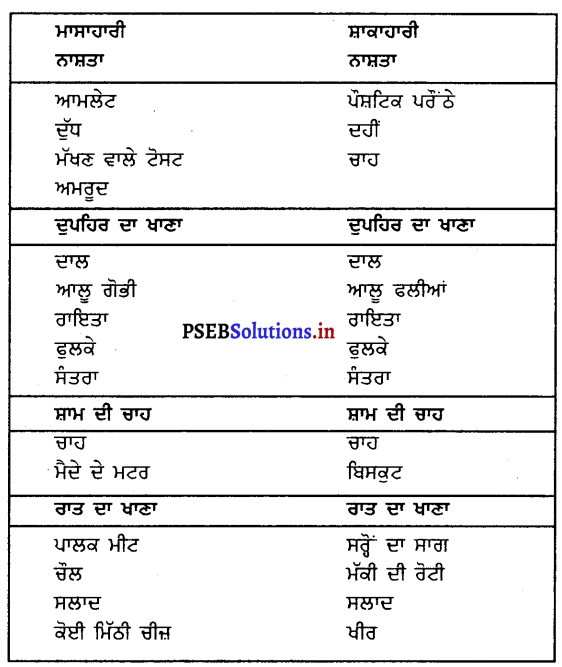Punjab State Board PSEB 7th Class Home Science Book Solutions Practical ਕੁਝ ਭੋਜਨ ਨੁਸਖੇ Notes.
PSEB 7th Class Home Science Practical ਕੁਝ ਭੋਜਨ ਨੁਸਖੇ
ਚੌਲ ਉਬਾਲਣਾ
ਸਮਾਨ-
ਵਧੀਆ ਚੌਲ – 1 ਗਿਲਾਸ
ਪਾਣੀ – 2 ਗਿਲਾਸ
ਨਮਕ – ਅੱਧਾ ਚਮਚਾ
ਵਿਧੀ – ਇਕ ਗਿਲਾਸ ਭਰ ਕੇ ਚੌਲ ਲੈ ਲਓ | ਥਾਲੀ ਵਿਚ ਪਾ ਕੇ ਚੁਣ ਲਉ ਅਤੇ ਧੋ ਲਵੋ । ਇਕ ਪਤੀਲੇ ਵਿਚ ਦੋ ਗਿਲਾਸ ਪਾਣੀ ਪਾ ਕੇ ਉਬਾਲੋ । ਇਸ ਵਿੱਚ ਚੌਲ ਅਤੇ ਨਮਕ ਪਾ ਦਿਓ। ਪਤੀਲੇ ਨੂੰ ਢੱਕ ਦਿਓ । ਜਦੋਂ ਪਾਣੀ ਸੁੱਕਣ ਲੱਗੇ ਤਾਂ ਇੱਕ ਦੋ ਦਾਣੇ ਚੌਲ ਖਾ ਕੇ ਦੇਖੋ । ਜੇ ਪਾਣੀ ਵਧ ਲੱਗੇ ਤਾਂ ਢਕਣ ਉਤਾਰ ਦਿਓ ਅਤੇ ਜੇ ਕਰ ਪਾਣੀ ਘਟ ਹੋਵੇ ਤਾਂ ਪਤੀਲਾ ਤਵੇ ਤੇ ਰੱਖ ਕੇ ਸੇਕ ਘੱਟ ਕਰ ਦਿਓ | ਮਰਜ਼ੀ ਅਨੁਸਾਰ ਚੌਲਾਂ ਵਿਚ ਘਿਓ ਦਾ ਇੱਕ ਵੱਡਾ ਚਮਚ ਭਰ ਕੇ ਪਾ ਸਕਦੇ ਹਾਂ । ਚੌਲ ਬਣ ਜਾਣ ਤੇ ਕਿਸੇ ਤਰੀ ਵਾਲੀ ਸਬਜ਼ੀ, ਦਾਲ, ਰਾਜਮਾਂਹ ਆਦਿ ਨਾਲ ਪਰੋਸੋ।
ਸਬਜ਼ੀਆਂ ਬਣਾਉਣ ਦੀ ਵਿਧੀ
ਮਟਰ ਪਨੀਰ ਦੀ ਰਸਦਾਰ ਸਬਜ਼ੀ
ਸਾਮਾਨ-
ਮਟਰ ਫਲੀ – 500 ਗਰਾਮ
ਪਨੀਰ – 200 ਗਰਾਮ
ਪਿਆਜ਼ – 2 ਵੱਡੇ
ਅਦਰਕ – ਇਕ ਵੱਡਾ ਟੁਕੜਾ
ਲੱਸਣ – 3-4 ਤੁਰੀਆਂ
ਹਰੀ ਮਿਰਚ – 3
ਦਹੀਂ – ਥੋੜ੍ਹਾ ਜਿਹਾ
ਨਮਕ – ਲੋੜ ਅਨੁਸਾਰ
ਟਮਾਟਰ – 2
ਲਾਲ ਮਿਰਚ ਪੀਸੀ ਹੋਈ – 1/2 ਛੋਟੇ ਚਮਚ
ਹਲਦੀ – 1/2 ਛੋਟੇ ਚਮਚ
ਧਨੀਆ ਪੀਸਿਆ – 1/2 ਛੋਟੇ ਚਮਚ
ਹਰਾ ਧਨੀਆ – ਥੋੜ੍ਹਾ ਜਿਹਾ
ਘਿਓ – ਤਲਣ ਤੇ ਸਬਜ਼ੀ ਬਣਾਉਣ ਲਈ
ਵਿਧੀ – ਮਟਰ ਦੇ ਦਾਣੇ ਕੱਢ ਲਓ | ਪਨੀਰ ਟੁਕੜਿਆਂ ਨੂੰ ਕੜਾਹੀ ਵਿਚ ਗੁਲਾਬੀ ਰੰਗ ਦਾ ਤਲ ਲਓ। ਪਿਆਜ਼, ਅਦਰਕ ਤੇ ਲੱਸਣ ਨੂੰ ਪੀਸ ਕੇ ਮਸਾਲੇ ਮਿਲਾ ਕੇ ਗਿੱਲਾ ਮਸਾਲਾ ਤਿਆਰ ਕਰ ਲਉ । ਦੇਗਚੀ ਵਿਚ ਘਿਓ ਗਰਮ ਕਰਕੇ ਮਸਾਲਾ ਭੁੰਨ ਲਓ ।ਉਸੇ ਵਿਚ ਦਹੀਂ ਤੇ ਟਮਾਟਰ ਪਾ ਦਿਓ ਅਤੇ ਚੰਗੀ ਤਰ੍ਹਾਂ ਭੁੰਨ ਲਓ, ਭੰਨ ਜਾਣ ਤੇ ਥੋੜ੍ਹੇ ਪਾਣੀ ਦੇ ਛਿੱਟੇ ਮਾਰ ਕੇ ਹੋਰ ਭੁੰਨੋ । ਅਜਿਹਾ ਦੋ ਤਿੰਨ ਵਾਰੀ ਕਰੋ । ਜਦੋਂ ਮਸਾਲਾ ਚੰਗੀ ਤਰ੍ਹਾਂ ਭੁੱਜ ਜਾਵੇ ਤਾਂ ਮਟਰ ਤੇ ਪਨੀਰ ਦੇ ਟੁਕੜੇ ਉਸ ਵਿਚ ਪਾ ਕੇ ਚੰਗੀ ਤਰ੍ਹਾਂ ਨਾਲ ਭੁੰਨ ਲਓ ਫਿਰ ਪਾਣੀ ਤੇ ਨਮਕ ਪਾ ਕੇ ਢੱਕ ਦਿਓ । ਮਟਰ ਦੇ ਗਲ ਜਾਣ ਤੇ ਗਰਮ ਮਸਾਲਾ ਤੇ ਹਰਾ ਧਨੀਆ ਪਾ ਕੇ ਉਤਾਰ ਲਓ । ਜੇਕਰ ਸਬਜ਼ੀ ਤੇ ਰੰਗ ਨਹੀਂ ਆਇਆ ਤਾਂ ਥੋੜ੍ਹਾ ਜਿਹਾ ਘਿਓ ਕਟੋਰੀ ਵਿਚ ਪਾ ਕੇ ਗਰਮ ਕਰੋ । ਥੱਲੇ ਉਤਾਰ ਕੇ ਉਸ ਵਿਚ ਥੋੜ੍ਹਾ ਜਿਹਾ ਰਤਨ ਜੋਤ ਪਾ ਦਿਓ । ਥੋੜ੍ਹੀ ਦੇਰ ਵਿਚ ਉਸ ਦਾ ਰੰਗ ਲਾਲ ਘਿਓ ਵਿਚ ਆ ਜਾਵੇਗਾ । ਘਿਓ ਨੂੰ ਕੱਪੜੇ ਵਿਚ ਛਾਣ ਕੇ ਸਬਜ਼ੀ ਦੇ ਉੱਪਰ ਪਾ ਕੇ ਹਿਲਾਓ ।
ਕੁੱਲ ਮਾਤਰਾ-4-5 ਆਦਮੀਆਂ ਲਈ ।
![]()
ਆਲੂ ਦਮ
ਸਾਮਾਨ-
ਆਲੂ – 500 ਗਰਾਮ
ਪਿਆਜ਼ – 2
ਅਦਰਕ – 1 ਟੁਕੜਾ
ਟਮਾਟਰ – 1 ਵੱਡਾ
ਜ਼ੀਰਾ, ਹਲਦੀ ਲਾਲ ਮਿਰਚ ਧਨੀਆ ਚੂਰਨ ਰੂਪ ਵਿਚ – ਲੋੜ ਅਨੁਸਾਰ
ਨਮਕ – ਲੋੜ ਅਨੁਸਾਰ
ਗਰਮ ਮਸਾਲਾ – 1/2 ਚਮਚ
ਘਿਓ – ਆਲੂਆਂ ਨੂੰ ਤਲਣ ਲਈ ਅਤੇ ਮਸਾਲਾ ਭੁੰਨਣ ਲਈ
ਹਰਾ ਧਨੀਆ – ਥੋੜ੍ਹਾ ਜਿਹਾ
ਵਿਧੀ – ਆਲੂਆਂ ਨੂੰ ਚੰਗੀ ਤਰ੍ਹਾਂ ਧੋ ਕੇ ਛਿੱਲ ਲਉ । ਹੁਣ ਹਰ ਇਕ ਆਲੂ ਨੂੰ ਕਾਂਟੇ ਨਾਲ ਘੁਮਾ-ਘੁਮਾ ਕੇ ਗੋਦ ਲਓ ਕੜਾਹੀ ਵਿਚ ਘਿਓ ਪਾ ਕੇ ਗਰਮ ਕਰੋ । ਇਸ ਘਿਓ ਵਿਚ ਗੋਦੇ ਹੋਏ ਆਲੂਆਂ ਨੂੰ ਸੁਰਖ਼ ਹੋਣ ਤਕ ਤਲ ਲਓ। ਪਿਆਜ਼, ਅਦਰਕ ਅਤੇ ਹੋਰ ਮਸਾਲੇ ਮਿਲਾ ਕੇ ਮਿਕਸੀ ਵਿਚ ਜਾਂ ਸਿਲਵੱਟੇ ਤੇ ਗਿੱਲਾ ਮਸਾਲਾ ਤਿਆਰ ਕਰੋ । ਹੁਣ ਮਸਾਲੇ ਨੂੰ ਘਿਓ ਵਿਚ ਕੁੰਨੋ । ਭੁੰਨਦੇ ਸਮੇਂ ਟਮਾਟਰ ਨੂੰ ਛੋਟੇ-ਛੋਟੇ ਟੁਕੜੇ ਕਰ ਕੇ ਮਸਾਲੇ ਵਿਚ ਮਿਲਾ ਦਿਓ । ਟਮਾਟਰ ਇਕ ਦਮ ਮਿਲ ਜਾਣਾ ਚਾਹੀਦਾ ਹੈ । ਟਮਾਟਰ ਦੀ ਥਾਂ ਤੇ ਦਹੀਂ ਵੀ ਪਾਇਆ ਜਾ ਸਕਦਾ ਹੈ । ਭੰਨਦੇ ਸਮੇਂ ਮਸਾਲੇ ਨੂੰ ਕੜਛੀ ਨਾਲ ਹਿਲਾਉਂਦੇ ਰਹੋ । ਹੁਣ ਤਲੇ ਹੋਏ ਆਲੂਆਂ ਨੂੰ ਭੁੰਨੇ ਹੋਏ ਮਸਾਲੇ ਵਿਚ ਪਾ ਕੇ ਚੰਗੀ ਤਰ੍ਹਾਂ ਹਿਲਾਓ | ਪਾਣੀ ਨਾ ਪਾਓ | ਮੱਧਮ ਅੱਗ ਤੇ ਪਕਾਓ । ਆਲੂਆਂ ਦੇ ਗਲ ਜਾਣ ਤੋਂ ਗਰਮ ਮਸਾਲਾ ਅਤੇ ਹਰਾ ਧਨੀਆ ਪਾ ਕੇ ਉਤਾਰ ਲਓ ।
ਕੁੱਲ ਮਾਤਰਾ-4 ਆਦਮੀਆਂ ਲਈ ।
ਬੈਂਗਣ ਦਾ ਭਰਥਾ
ਸਾਮਾਨ-
ਗੋਲ ਬੈਂਗਣ – 200 ਗਰਾਮ
ਪਿਆਜ਼ – 1
ਟਮਾਟਰ – 1
ਅਦਰਕ – 1 ਟੁਕੜਾ
ਨਮਕ – ਲੋੜ ਅਨੁਸਾਰ
ਜ਼ੀਰਾ – 1/2 ਚਮਚ
ਹਲਦੀ ਚੂਰਨ – 1/2 ਛੋਟਾ ਚਮਚ
ਧਨੀਆ – 1/2 ਛੋਟਾ ਚਮਚ
ਹਰੀ ਮਿਰਚ – 2
ਹਰਾ ਧਨੀਆ – ਥੋੜ੍ਹਾ ਜਿਹਾ
ਘਿਓ – 2 ਚਮਚ
ਵਿਧੀ – ਗੋਲ ਬੈਂਗਣ ਨੂੰ ਥੋੜਾ ਚੀਰ ਕੇ ਵੇਖ ਲਓ ਕਿ ਉਹ ਅੰਦਰੋਂ ਖ਼ਰਾਬ ਤਾਂ ਨਹੀਂ ਹੈ, ਕੋਈ ਕੀੜਾ ਆਦਿ ਤਾਂ ਨਹੀਂ ਹੈ । ਇਸ ਨੂੰ ਅੱਗ ਤੇ ਭੁੰਨ ਲਓ । ਚੰਗੀ ਤਰ੍ਹਾਂ ਭੁੱਜ ਜਾਣ ਦੇ ਬਾਅਦ ਉਸ ਦਾ ਛਿਲਕਾ ਉਤਾਰ ਕੇ ਉਸ ਨੂੰ ਹੱਥ ਨਾਲ ਮਲ ਦਿਓ । ਚੰਗੀ ਤਰ੍ਹਾਂ ਪੱਕਿਆ ਹੋਇਆ ਬੈਂਗਣ ਹੱਥ ਨਾਲ ਮਸਲਿਆ ਜਾਂਦਾ ਹੈ । ਪਿਆਜ਼ ਤੇ ਅਦਰਕ ਛਿੱਲ ਲਓ । ਪਿਆਜ਼, ਅਦਰਕ ਤੇ ਹਰੀ ਮਿਰਚ ਨੂੰ ਬਰੀਕ ਕੱਟ ਲਓ । ਟਮਾਟਰ ਨੂੰ ਛੋਟੇ-ਛੋਟੇ ਟੁਕੜੇ ਕਰਕੇ ਕੱਟ ਲਓ । ਕੜਾਹੀ ਵਿਚ ਘਿਓ ਪਾ ਕੇ ਗਰਮ ਕਰੋ । ਇਸ ਵਿਚ ਜ਼ੀਰੇ ਦਾ ਤੜਕਾ ਲਾ ਕੇ ਪਿਆਜ਼, ਅਦਰਕ, ਹਰੀ ਮਿਰਚ ਪਾ ਕੇ ਭੁੰਨੋ | ਹਲਦੀ ਮਿਰਚ ਨਮਕ ਵੀ ਪਾ ਦਿਓ । ਭੁੰਨਦੇਭੰਨਦੇ ਹੀ ਟਮਾਟਰ ਪਾ ਦਿਓ ਅਤੇ ਹਿਲਾਉਂਦੇ ਰਹੋ । ਜਦੋਂ ਮਸਾਲਾ ਸੁਰਖ਼ ਹੋ ਜਾਵੇ ਬੈਂਗਣ ਦਾ ਕੁਚਲਾ ਪਾ ਕੇ ਖੂਬ ਮਿਲਾ ਕੇ ਮੱਧਮ ਅੱਗ ਤੇ ਥੋੜ੍ਹੀ ਦੇਰ ਪਕਾਓ। ਪੂਰੀ ਤਰ੍ਹਾਂ ਪੱਕਣ ਜਾਂ ਭੰਨਣ ਤੇ ਹਰੇ ਧਨੀਆਂ ਦੀਆਂ ਪੱਤੀਆਂ ਕੱਟ ਕੇ ਛਿੜਕ ਕੇ ਪਰੋਸੋ । ਟਮਾਟਰ ਦੀ ਥਾਂ ਤੇ ਖਟਾਈ ਚੂਰਨ ਜਾਂ ਨਿੰਬੂ ਦਾ ਪ੍ਰਯੋਗ ਵੀ ਕੀਤਾ ਜਾ ਸਕਦਾ ਹੈ ।
ਕੁੱਲ ਮਾਤਰਾ-2-3 ਆਦਮੀਆਂ ਲਈ ।
ਜੇਕਰ ਪਿਆਜ਼ ਨਾ ਪਾਉਣਾ ਹੋਵੇ ਤਾਂ ਘਿਓ ਜਾਂ ਤੇਲ ਵਿਚ ਹਿੰਗ ਜਾਂ ਰਾਈ, ਜੀਰੇ ਅਤੇ ਮਿਰਚ ਦਾ ਛੱਕ ਦੇ ਕੇ ਥੋੜ੍ਹਾ ਦਹੀਂ, ਖਟਾਈ ਚੂਰਨ ਜਾਂ ਟਮਾਟਰ ਭੁੰਨ ਲਓ । ਇਸ ਵਿਚ ਪ੍ਰੈਕਟੀਕਲ ਬੈਂਗਣ (ਭਰਥਾ) ਅਤੇ ਨਮਕ ਪਾ ਕੇ ਭੁੰਨੋ । ਭੁੱਜ ਜਾਣ ਤੇ ਉਸ ਵਿਚ ਹਰੇ ਧਨੀਆਂ ਦੀਆਂ ਪੱਤੀਆਂ ਕੱਟ ਕੇ ਛਿੜਕ ਦਿਓ ।
ਨੋਟ – ਆਲੂ, ਕੇਲਾ, ਅਰੂਈ, ਜਿੰਮੀਕੰਦ, ਮਟਰ, ਛੋਲੇ ਆਦਿ ਦੇ ਭਰਥੇ ਦੇ ਲਈ ਉਸ ਨੂੰ ਉਬਾਲ ਕੇ ਕੁਚਲ ਦਿੱਤਾ ਜਾਂਦਾ ਹੈ । ਕੁਚਲੀ ਹੋਈ ਸਬਜ਼ੀ ਜਾਂ ਭਰਥੇ, ਬੈਂਗਣ ਦੇ ਭਰਥੇ ਦੀ ਤਰ੍ਹਾਂ ਹੀ ਬਣਾਇਆ ਜਾਂਦਾ ਹੈ ।
ਫੁੱਲ ਗੋਭੀ-ਆਲੂ
ਸਾਮਾਨ-
ਫੁੱਲ ਗੋਭੀ – 1 ਫੁੱਲ
ਆਲੂ – 250 ਗਰਾਮ
ਪਿਆਜ਼ – 2
ਲੱਸਣ – 2-3 ਟੁਕੜੇ
ਖਟਾਈ ਚੂਰਨ – 1/2 ਛੋਟੇ ਚਮਚ
ਜ਼ੀਰਾ – 1/2 ਛੋਟੇ ਚਮਚੇ
ਹਲਦੀ ਚੂਰਨ – 1/2 ਛੋਟੇ ਚਮਚ
ਹਰਾ ਧਨੀਆ – ਥੋੜ੍ਹਾ ਜਿਹਾ
ਨਮਕ – ਲੋੜ ਅਨੁਸਾਰ
ਗਰਮ ਮਸਾਲਾ – 1/2 ਛੋਟੇ ਚਮਚ
ਅਦਰਕ – 1 ਟੁਕੜਾ
ਹਰੀ ਮਿਰਚ – 2
ਘਿਓ – 2 ਚਮਚ
![]()
ਵਿਧੀ – ਆਲੂ ਧੋ ਕੇ, ਪਤਲਾ ਛਿੱਲ ਕੇ ਮੱਧਮ ਆਕਾਰ ਦੇ ਟੁਕੜਿਆਂ ਵਿਚ ਕੱਟ ਲਓ । ਫੁੱਲ ਗੋਭੀ ਨੂੰ ਵੀ ਮੱਧਮ ਆਕਾਰ ਦੇ ਟੁਕੜਿਆਂ ਵਿਚ ਕੱਟ ਕੇ ਧੋ ਲਓ । ਪਿਆਜ਼, ਲੱਸਣ, ਅਦਰਕ ਨੂੰ ਛਿੱਲ ਕੇ ਬਰੀਕ ਕੱਟ ਲਓ | ਹਰੀ ਮਿਰਚ ਵੀ ਬਰੀਕ ਕੱਟ ਲਓ | ਕੜਾਹੀ ਜਾਂ ਪਤੀਲੀ ਵਿਚ ਘਿਓ ਗਰਮ ਕਰਕੇ ਅਤੇ ਜ਼ੀਰੇ ਦਾ ਸ਼ੌਕ ਦੇ ਕੇ ਪਿਆਜ਼, ਲੱਸਣ, ਅਦਰਕ ਅਤੇ ਹਰੀ ਮਿਰਚ ਨੂੰ ਭੁੰਨੋ । ਇਸੇ ਵਿਚ ਆਲੂ ਅਤੇ ਗੋਭੀ ਦੇ ਟੁਕੜੇ ਪਾ ਕੇ ਕੁਝ ਦੇਰ ਤਕ ਭੁੰਨੋ । ਹਲਦੀ, ਮਿਰਚ, ਧਨੀਆ, ਨਮਕ ਆਦਿ ਮਸਾਲੇ ਵੀ ਪਾ ਦਿਓ | ਸਬਜ਼ੀ ਨੂੰ ਚੰਗੀ ਤਰ੍ਹਾਂ ਹਿਲਾ ਕੇ ਢੱਕ ਕੇ ਮੱਧਮ ਅੱਗ ਤੇ ਪਕਾਓ | ਆਲੂ ਅਤੇ ਗੋਭੀ ਗਲ ਜਾਣ ਤੇ ਉਸ ਵਿਚ ਗਰਮ ਮਸਾਲਾ ਅਤੇ ਖਟਾਈ ਚੂਰਨ ਪਾ ਕੇ 5-10 ਮਿੰਟ ਤਕ ਅੱਗ ਤੇ ਰਹਿਣ ਦਿਓ । ਫਿਰ ਉਤਾਰ ਲਓ ।
ਨੋਟ – ਸਿਰਫ਼ ਗੋਭੀ ਦੀ ਸਬਜ਼ੀ ਬਣਾਉਣੀ ਹੋਵੇ ਤਾਂ ਆਲੂ ਪਾਉਣ ਦੀ ਲੋੜ ਨਹੀਂ । ਇਸੇ ਤਰ੍ਹਾਂ ਗੋਭੀ, ਮਟਰ, ਪਰਵਲ ਅਤੇ ਆਲੂ ਆਦਿ ਦੀ ਸਬਜ਼ੀ ਬਣਾਈ ਜਾ ਸਕਦੀ ਹੈ ।
ਪਤਲੀ ਖਿਚੜੀ
ਸਾਮਾਨ-
ਚੌਲ – 1 ਕਟੋਰੀ
ਮੂੰਗੀ ਦੀ ਧੋਤੀ ਦਾਲ – 1/2 ਕਟੋਰੀ
ਜ਼ੀਰਾ – 1 ਚਮਚ
ਪਿਆਜ਼ – 1/2
ਨਮਕ – 1/2 ਚਮਚ
ਪਾਣੀ – ਪੰਜ ਕਟੋਰੀਆਂ
ਵਿਧੀ – ਦਾਲ ਅਤੇ ਚੌਲਾਂ ਨੂੰ ਚੁਣ ਕੇ ਵੱਖ-ਵੱਖ ਭਿਉਂ ਲਵੋ । ਪੰਜ ਕਟੋਰੀਆਂ ਪਾਣੀ ਉਬਾਲ ਕੇ ਦਾਲ ਨੂੰ 10-15 ਮਿੰਟ ਪਕਾਓ ਅਤੇ ਫਿਰ ਚੌਲ ਪਾ ਦਿਓ । ਇਸ ਦੇ ਨਾਲ ਹੀ ਨਮਕ, ਜ਼ੀਰਾ ਅਤੇ ਕੱਟਿਆ ਹੋਇਆ ਪਿਆਜ਼ ਵੀ ਪਾ ਦਿਓ । ਪਤੀਲੇ ਨੂੰ ਢੱਕ ਕੇ ਪਕਾਓ ਤਾਂ ਕਿ ਚੌਲ ਅਤੇ ਦਾਲ ਗਲ ਕੇ ਆਪਸ ਵਿਚ ਮਿਲ ਜਾਣ । ਇਹ ਖਿਚੜੀ ਪਤਲੀ ਹੋਣੀ ਚਾਹੀਦੀ ਹੈ । ਇਹ ਬਿਮਾਰਾਂ ਨੂੰ ਦਿੱਤੀ ਜਾਂਦੀ ਹੈ । ਜੇਕਰ ਰੋਗੀ ਪਚਾ ਸਕੇ ਤਾਂ ਥੋੜ੍ਹਾ ਘਿਓ ਵੀ ਪਾਇਆ ਜਾ ਸਕਦਾ ਹੈ ।
ਨੋਟ – ਇਸ ਵਿਚ ਵਧੇਰੇ ਮਿਰਚ, ਮਸਾਲੇ ਦੀ ਵਰਤੋਂ ਨਹੀਂ ਕਰਨੀ ਚਾਹੀਦੀ ।
ਦਲੀਆ
ਸਾਮਾਨ-
ਦਲੀਆ – 1 ਵੱਡਾ ਚਮਚ
ਪਾਣੀ – 1 ਗਿਲਾਸ ਜਾਂ ਲੋੜ ਅਨੁਸਾਰ
ਖੰਡ ਤੇ ਦੁੱਧ – ਲੋੜ ਅਨੁਸਾਰ ਜੇ ਮਿੱਠਾ ਬਣਾਉਣਾ ਹੋਵੇ) ।
ਨਮਕ ਤੇ ਨਿੰਬੂ – ਲੋੜ ਅਨੁਸਾਰ (ਜੇ ਨਮਕੀਨ ਬਣਾਉਣਾ ਹੋਵੇ)
ਵਿਧੀ – ਦਲੀਏ ਨੂੰ ਬਰਤਨ ਵਿਚ ਖੂਬ ਭੁੰਨ ਲਓ। ਗੁਲਾਬੀ ਰੰਗ ਦਾ ਹੋ ਜਾਣ ਤੇ ਉਬਲਦੇ ਹੋਏ ਪਾਣੀ ਵਿਚ ਪਕਾਓ । ਜਦੋਂ ਦਲੀਆ ਚੰਗੀ ਤਰ੍ਹਾਂ ਪੱਕ ਜਾਵੇ ਤਾਂ ਦੁੱਧ ਤੇ ਖੰਡ ਮਿਲਾ ਕੇ ਰੋਗੀ ਨੂੰ ਦਿਓ । ਜੇ ਬਿਮਾਰ ਨਮਕੀਨ ਖਾਣਾ ਚਾਹਵੇ ਤਾਂ ਦਲੀਏ ਵਿਚ ਲੋੜ ਅਨੁਸਾਰ ਨਮਕ, ਕਾਲੀ ਮਿਰਚ ਤੇ ਨਿੰਬੂ ਪਾ ਕੇ ਦਿੱਤਾ ਜਾ ਸਕਦਾ ਹੈ ।
ਨੋਟ – ਇਹ ਤਾਕਤਵਰ ਹਲਕਾ ਭੋਜਨ ਹੈ ਇਸ ਵਿਚ ਪ੍ਰੋਟੀਨ, ਕਾਰਬੋਹਾਈਡਰੇਟ ਤੇ ਲਵਣ ਹੁੰਦੇ ਹਨ। ਇਹ ਬਿਮਾਰ ਦੇ ਨਾਲ-ਨਾਲ ਬੱਚਿਆਂ ਨੂੰ ਨਾਸ਼ਤੇ ਵਿਚ ਵੀ ਦਿੱਤਾ ਜਾ ਸਕਦਾ ਹੈ ।
ਸਾਬੂਦਾਣੇ ਦੀ ਖੀਰ
ਸਾਮਾਨ-
ਸਾਬੂਦਾਣਾ – 1 ਜਾਂ 2 ਵੱਡੇ ਚਮਚ
ਦੁੱਧ – 2 ਕੱਪ
ਖੰਡ – 1 ਚਮਚ ਜਾਂ ਲੋੜ ਅਨੁਸਾਰ
ਵਿਧੀ – ਸਭ ਤੋਂ ਪਹਿਲਾਂ ਸਾਬੂਦਾਣੇ ਨੂੰ ਚੰਗੀ ਤਰ੍ਹਾਂ ਸਾਫ਼ ਕਰ ਲਓ । ਉਬਲਦੇ ਹੋਏ ਪਾਣੀ ਵਿਚ ਇੰਨਾ ਪਕਾ ਲਓ ਕਿ ਸਾਬੂਦਾਣਾ ਚੰਗੀ ਤਰ੍ਹਾਂ ਗਲ ਜਾਵੇ, ਹੁਣ ਦੁੱਧ ਜਾਂ ਖੰਡ ਮਿਲਾ ਕੇ ਰੋਗੀ ਨੂੰ ਖਾਣ ਲਈ ਦਿਓ ।
ਨੋਟ – ਸਾਬੂਦਾਣਾ ਇਕ ਹਲਕਾ ਤੇ ਛੇਤੀ ਹਜ਼ਮ ਹੋਣ ਵਾਲਾ ਸੁਆਦੀ ਭੋਜਨ ਹੈ । ਇਸ ਵਿਚ ਕਾਰਬੋਹਾਈਡਰੇਟ ਤੇ ਲਵਣ ਮਿਲਦੇ ਹਨ | ਬੁਖ਼ਾਰ ਜਾਂ ਗਲੇ ਵਿਚ ਦਰਦ ਹੋਣ ਤੇ ਇਹ ਰੋਗੀ ਨੂੰ ਦਿੱਤਾ ਜਾਂਦਾ ਹੈ ।
![]()
ਸਾਦੀ ਕਾਫੀ
ਸਾਮਾਨ-
ਕਾਫੀ ਪਾਊਡਰ – 1/2 ਤੋਂ 3/4 ਛੋਟੇ ਚਮਚ
ਚੀਨੀ – 1 ਤੋਂ 1\(\frac { 1 }{ 2 }\) ਛੋਟੇ ਚਮਚ
ਗਰਮ ਦੁੱਧ – 2-1 ਵੱਡੇ ਚਮਚ
ਉਬਲਦਾ ਹੋਇਆ ਪਾਣੀ – 1 ਕੱਪ
ਵਿਧੀ – ਪਾਣੀ ਨੂੰ ਉਬਾਲ ਲਓ ਤੇ ਪਹਿਲਾਂ ਤੋਂ ਗਰਮ ਕੀਤੀ ਹੋਈ ਕੇਤਲੀ ਵਿਚ ਪਾਓ । ਜਿਵੇਂ ਗਰਮ ਚਾਹ ਦੇ ਲਈ ਕੀਤਾ ਜਾਂਦਾ ਹੈ। ਕਾਫੀ ਬਣਾਉਂਦੇ ਸਮੇਂ ਕਾਫੀ ਪਾਊਡਰ ਨੂੰ ਕੱਪ ਵਿਚ ਪਾ ਕੇ ਗਰਮ ਪਾਣੀ ਪਾਓ ਅਤੇ ਉਸ ਨੂੰ ਹਿਲਾਓ । ਇਸ ਵਿਚ ਗਰਮ ਦੁੱਧ ਤੇ ਚੀਨੀ ਪਾ ਕੇ ਪਰੋਸੋ ।
ਕੁੱਲ ਮਾਤਰਾ -1 ਕੱਪ
ਐੱਸ ਪਰੈਸੋ ਕਾਫੀ
ਸਾਮਾਨ-
ਕਾਫੀ ਪਾਊਡਰ – 3/4 ਛੋਟਾ ਚਮਚ
ਚੀਨੀ – 1\(\frac { 1 }{ 2 }\) ਛੋਟੇ ਚਮਚ
ਦੁੱਧ – 1/2 ਕੱਪ
ਪਾਣੀ – 1/2 ਕੱਪ
ਚਾਕਲੇਟ ਪਾਊਡਰ – ਥੋੜਾ ਜਿਹਾ
ਵਿਧੀ – ਕੱਪ ਵਿਚ ਕਾਫੀ ਅਤੇ ਖੰਡ ਪਾ ਕੇ ਥੋੜੇ ਜਿਹੇ ਪਾਣੀ ਦੀ ਸਹਾਇਤਾ ਨਾਲ ਉਸ ਨੂੰ ਚੰਗੀ ਤਰ੍ਹਾਂ ਫੈਂਟੋ ਦੁੱਧ ਅਤੇ ਪਾਣੀ ਮਿਲਾ ਕੇ ਉਬਾਲੋ । ਉਬਲਿਆ ਹੋਇਆ ਦੁੱਧ ਅਤੇ ਪਾਣੀ ਫੈਂਟੀ ਹੋਈ ਕਾਫੀ ਵਿਚ ਮਿਲਾ ਕੇ ਉਪਰੋਂ ਥੋੜਾ ਜਿਹਾ ਚਾਕਲੇਟ ਪਾਉਡਰ ਪਾ ਕੇ ਪਰੋਸੋ ।
ਕੁੱਲ ਮਾਤਰਾ-1 ਕੱਪ
ਠੰਢੀ ਕਾਫੀ
ਸਾਮਾਨ-
ਦੁੱਧ – 1 ਕੱਪ
ਕਾਫੀ ਪਾਊਡਰ – 1 ਛੋਟਾ ਚਮਚ
ਚੀਨੀ – 1\(\frac { 1 }{ 2 }\) ਛੋਟੇ ਚਮਚ
ਵਿਧੀ – ਦੁੱਧ ਨੂੰ ਉਬਾਲ ਕੇ ਠੰਢਾ ਕਰ ਲਓ । ਕਾਫੀ ਪਾਊਡਰ ਅਤੇ ਚੀਨੀ ਨੂੰ ਮਿਲਾ ਕੇ ਉਸ ਵਿਚ ਦੁੱਧ ਪਾਓ ਅਤੇ ਚੰਗੀ ਤਰ੍ਹਾਂ ਮਿਲਾਓ। ਹੁਣ ਇਸ ਵਿਚ ਬਰਫ਼ ਨੂੰ ਪੂਰਾ ਕਰਕੇ ਚੰਗੀ ਤਰ੍ਹਾਂ ਮਿਲਾ ਲਓ । ਜੇ ਹੋ ਸਕੇ ਤਾਂ ਉੱਪਰ ਦੇ ਮਿਸ਼ਰਨ ਨੂੰ ਮਿਕਸੀ ਵਿਚ ਫੈਂਟ ਲਓ । ਪਰੋਸਦੇ ਸਮੇਂ ਜੇਕਰ ਚਾਹੋ ਤਾਂ ਉੱਪਰ ਕਰੀਮ ਜਾਂ ਆਈਸ ਕਰੀਮ ਦੀ ਵਰਤੋਂ ਕਰ ਸਕਦੇ ਹੋ ।
ਕੁੱਲ ਮਾਤਰਾ-1 ਛੋਟਾ ਗਿਲਾਸ
ਨਿਬੂ ਵਾਲੀ ਠੰਢੀ ਚਾਹ
ਸਾਮਾਨ-
ਚਾਹ ਦੀ ਪੱਤੀ -3/4 ਛੋਟਾ ਚਮਚ
ਉਬਲਿਆ ਹੋਇਆ ਪਾਣੀ -1 ਕੱਪ
ਚੀਨੀ, ਨਿਬੂ – ਸਵਾਦ ਅਨੁਸਾਰ
ਬਰਫ਼ -ਕੁਝ ਟੁਕੜੇ
![]()
ਵਿਧੀ – ਗਰਮ ਚਾਹ ਦੀ ਤਰ੍ਹਾਂ ਚਾਹ ਬਣਾ ਕੇ ਛਾਣ ਦਿਓ । ਇਸ ਵਿਚ ਚੀਨੀ ਮਿਲਾ ਕੇ ਕੁੱਟੀ ਹੋਈ ਬਰਫ਼ ਪਾ ਦਿਓ । ਹੁਣ ਇਸ ਨੂੰ ਨਿੰਬੂ ਦੇ ਨਾਲ ਪਰੋਸੋ । ਕੁੱਲ ਮਾਤਰਾ -1 ਛੋਟਾ ਗਿਲਾਸ
ਸ਼ਿਕੰਜ਼ਵੀ
ਸਾਮਾਨ-
ਨਿੰਬੂ – 2
ਪਾਣੀ – 500 ਮਿਲੀਲਿਟਰ ਚੀਨੀ
ਲੋੜ ਅਨੁਸਾਰ ਕਾਲੀ ਮਿਰਚ – ਸੁਆਦ ਅਨੁਸਾਰ
ਬਰਫ਼ – ਠੰਢੀ ਕਰਨ ਲਈ
ਵਿਧੀ – ਪਾਣੀ ਵਿਚ ਖੰਡ ਪਾ ਕੇ ਚੰਗੀ ਤਰ੍ਹਾਂ ਮਿਲਾਓ । ਫਿਰ ਉਸ ਵਿਚ ਨਿੰਬੂ ਦਾ ਰਸ ਮਿਲਾ ਦਿਓ । ਇਸ ਘੋਲ ਨੂੰ ਛਾਣ ਕੇ ਅਤੇ ਸੁਆਦ ਅਨੁਸਾਰ ਨਮਕ ਤੇ ਕਾਲੀ ਮਿਰਚ ਪਾਓ । ਠੰਢੀ ਕਰਨ ਲਈ ਬਰਫ਼ ਪਾਓ । ਸ਼ਿਕੰਜਵੀ ਤਿਆਰ ਹੈ, ਕੱਚ ਦੇ ਗਿਲਾਸਾਂ ਵਿਚ ਪਰੋਸੋ।
ਲੱਸੀ
ਸਾਮਾਨ+
ਦਹੀਂ – 100 ਗਰਮ
ਪਾਣੀ – 1 ਗਿਲਾਸ
ਚੀਨੀ ਜਾਂ ਨਮਕ – ਲੋੜ ਅਨੁਸਾਰ
ਵਿਧੀ – ਦਹੀਂ ਨੂੰ ਡੂੰਘੇ ਬਰਤਨ ਜਿਵੇਂ ਗੜਵੀ ਜਾਂ ਜੱਗ ਵਿਚ ਪਾ ਕੇ ਲੱਕੜ ਦੀ ਮਧਾਣੀ ਜਾਂ ਬਿਜਲੀ ਵਾਲੀ ਮਧਾਣੀ ਨਾਲ ਰਿੜਕੋ ਅਤੇ ਇਸ ਵਿਚ ਪਾਣੀ ਪਾ ਦਿਓ । ਪਾਣੀ ਪਾਉਣ ਤੋਂ ਬਾਅਦ ਥੋੜ੍ਹੀ ਦੇਰ ਲਈ ਫਿਰ ਰਿੜਕੋ ਇਸ ਵਿਚ ਲੋੜ ਅਨੁਸਾਰ ਚੀਨੀ ਜਾਂ ਨਮਕ ਪਾ ਲਓ ਅਤੇ ਇਸ ਵਿਚ ਬਰਫ਼ ਪਾ ਕੇ ਠੰਡੀ ਕਰਕੇ ਪੀਣ ਲਈ ਦਿਓ ।






